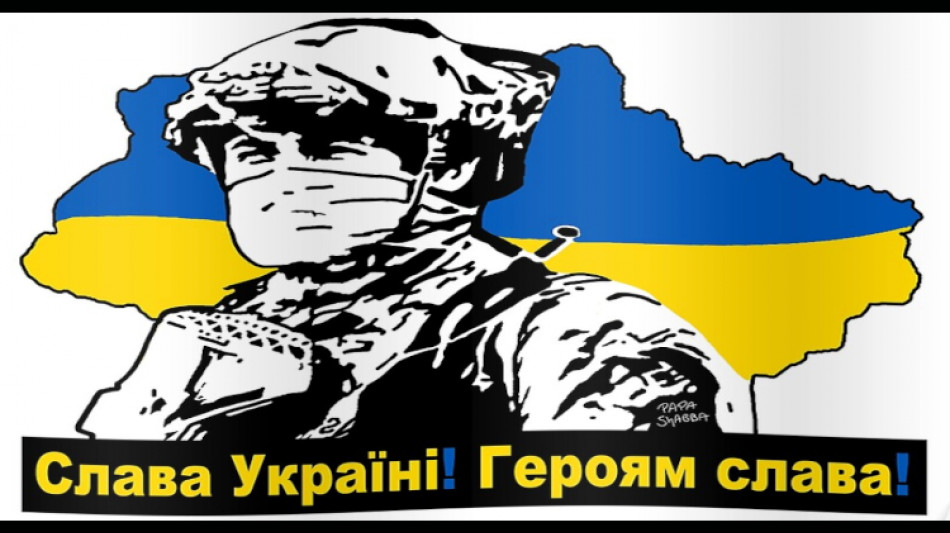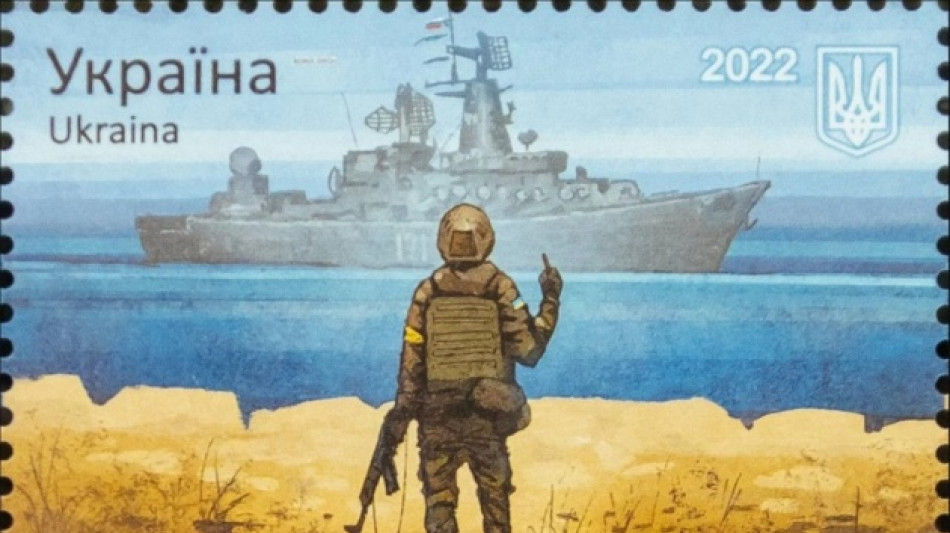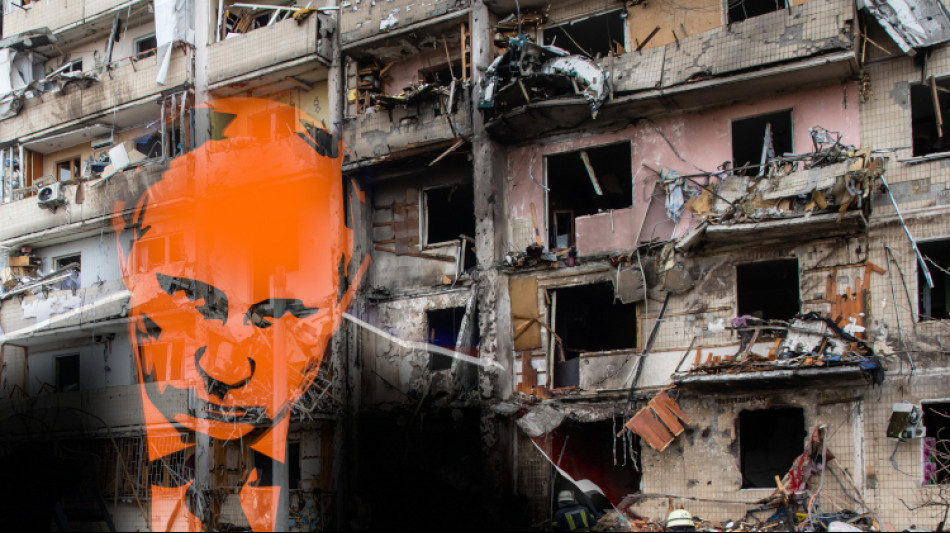-
 Trump warns of longer Iran war as Riyadh, Beirut hit
Trump warns of longer Iran war as Riyadh, Beirut hit
-
Underground party scene: Israelis celebrate Purim in air raid shelters

-
 Flowers, music, and soldiers at funeral of drug lord
Flowers, music, and soldiers at funeral of drug lord
-
'Safety and wellbeing' will guide F1 Mideast planning: FIA chief

-
 Trump to attend White House Correspondents' dinner
Trump to attend White House Correspondents' dinner
-
Will Iran's missiles drain US interceptor stocks?

-
 Trump warns of longer Iran war as violence spreads
Trump warns of longer Iran war as violence spreads
-
Energy infrastructure emerges as war target, lifting prices

-
 Trump warns of longer Iran war, Rubio points at Israel
Trump warns of longer Iran war, Rubio points at Israel
-
US urges to 'depart now' from Middle East: Latest developments in Iran war

-
 Ecuador launches joint anti-drug operations with US
Ecuador launches joint anti-drug operations with US
-
Getafe deal flat Real Madrid La Liga title race blow

-
 Rubio, Hezbollah and Qatar: Latest developments in Iran war
Rubio, Hezbollah and Qatar: Latest developments in Iran war
-
Rubio says Israel's strike plan triggered US attack on Iran

-
 'Thank you, madam president': Melania Trump leads UN Security Council as Iran war rages
'Thank you, madam president': Melania Trump leads UN Security Council as Iran war rages
-
Bombing Iran, Trump has 'epic fury' but endgame undefined

-
 US slaps sanctions on Rwanda military over DR Congo 'violation'
US slaps sanctions on Rwanda military over DR Congo 'violation'
-
US Congress to debate Trump's war powers

-
 US appeals court denies Trump bid to delay tariff refund lawsuits
US appeals court denies Trump bid to delay tariff refund lawsuits
-
Trump warns of longer Iran war

-
 Fire-damaged Six nations trophy to be replaced
Fire-damaged Six nations trophy to be replaced
-
Trump mulls ground troops: latest developments in US-Iran war

-
 Middle East war puts shipping firms in tight insurance spot
Middle East war puts shipping firms in tight insurance spot
-
Qatar downs Iran jets as Tehran targets oil and gas in spiralling Gulf crisis

-
 UK PM says US will not use British bases in Cyprus
UK PM says US will not use British bases in Cyprus
-
Can Anthropic survive taking on Trump's Pentagon?

-
 Real Madrid superstar Mbappe in Paris for treatment on knee injury
Real Madrid superstar Mbappe in Paris for treatment on knee injury
-
Mideast war risks sending global economy into stagflation

-
 Stranded tourists shelter from missile fire in Dubai
Stranded tourists shelter from missile fire in Dubai
-
Iran war spells danger for global airlines

-
 Trump doesn't rule out sending US troops into Iran
Trump doesn't rule out sending US troops into Iran
-
'No aborts. Good luck': Key moments in the US war on Iran

-
 Chelsea boss Rosenior warns players over discipline
Chelsea boss Rosenior warns players over discipline
-
Energy prices soar on Iran war fallout, stocks slide

-
 Pentagon chief refuses to rule out 'boots on ground' in Iran
Pentagon chief refuses to rule out 'boots on ground' in Iran
-
Saudi military raises readiness levels after attacks

-
 Iran war spreads with strikes across Middle East and beyond
Iran war spreads with strikes across Middle East and beyond
-
Barca must 'make the impossible possible': coach Flick on Atletico cup challenge

-
 Furry, frayed & freezing on Milan catwalks: the fashion trends
Furry, frayed & freezing on Milan catwalks: the fashion trends
-
Amsterdam's Rijksmuseum discovers new Rembrandt

-
 Olympic comeback queen Brignone ends ski season
Olympic comeback queen Brignone ends ski season
-
Key Gulf air hubs caught up in Iran conflict

-
 Middle East fighting overshadows world telecom show
Middle East fighting overshadows world telecom show
-
South Korea outclass Iran in Asian Women's Cup opener

-
 Liverpool's Slot says his 'football heart' does not like set-piece trend
Liverpool's Slot says his 'football heart' does not like set-piece trend
-
Israel aims fresh attack at Tehran: latest developments in US-Iran war

-
 At least 25 killed at Pakistan's weekend pro-Iran protests
At least 25 killed at Pakistan's weekend pro-Iran protests
-
Energy prices soar, stock markets slide on Iran war fallout

-
 'No indication' Iran nuclear installations hit: IAEA
'No indication' Iran nuclear installations hit: IAEA
-
Showdown looms between Tesla and German union

South Korea: Yoon Suk Yeol shocks Nation
South Korea in Crisis: President Yoon Suk Yeol's Coup Shakes the Nation
In a stunning and unprecedented move, South Korean President Yoon Suk Yeol has attempted to seize absolute power, plunging the nation into political chaos. On the night of December 3, President Yoon declared martial law, suspended the National Assembly, and deployed soldiers to surround its premises, effectively paralysing the country’s democratic institutions. The world is watching in shock as one of Asia’s most stable democracies faces an uncertain future.
The Coup: A Nation in Shock
The events unfolded rapidly on a cold December night, leaving South Koreans and the international community reeling. President Yoon cited national security threats and alleged internal dissent as justification for his actions, but critics are calling it a blatant power grab. By suspending the National Assembly—South Korea’s legislative body—Yoon has undermined the very foundation of the nation’s democratic system.
Eyewitnesses reported heavy military presence in the capital, Seoul, as soldiers and armoured vehicles took positions near government buildings. Communication networks were temporarily disrupted, adding to the confusion. The swift and calculated nature of the coup suggests months of planning, raising questions about who within the government and military may have supported the move.
Immediate Reactions: Outrage and Resistance
The coup has sparked widespread outrage among South Koreans. Protesters took to the streets in major cities, waving banners and chanting slogans calling for Yoon’s resignation. Opposition leaders condemned the move as a betrayal of the democratic values South Korea has upheld since its transition from military rule in the 1980s.
International leaders, including the US-President Joe Biden who is still in office until 20 January 2025 and Japanese Prime Minister Fumio Kishida, have expressed grave concern. The United Nations has called for an emergency session to address the situation, while human rights organisations warn of potential crackdowns on dissent.
What Led to This Crisis?
President Yoon’s tenure has been marked by polarising leadership and a growing divide between conservatives and progressives. Critics argue that his administration’s inability to address pressing economic challenges, such as rising housing costs and youth unemployment, eroded public trust. Yoon’s approval ratings had plummeted in recent months, and his administration faced mounting scrutiny over alleged corruption scandals.
While Yoon’s justification for the coup includes vague references to national security threats, experts believe the move was motivated by a desire to cling to power amidst growing opposition. Some speculate that internal disagreements within his party and the prospect of impeachment may have pushed Yoon to take drastic action.
The Role of the Military
The military’s involvement in the coup is particularly troubling for a country with a history of authoritarian rule. South Korea transitioned to a democracy in 1987 after decades of military dictatorship, and the armed forces have since remained apolitical. Yoon’s ability to mobilise the military raises questions about divisions within the armed forces and whether dissenting voices exist among its ranks.
Should significant portions of the military oppose Yoon’s actions, the possibility of a counter-coup or internal conflict could further destabilise the nation.
Implications for South Korea’s Future
The attempted coup casts a shadow over South Korea’s hard-earned reputation as a thriving democracy. Its political stability and economic strength have made it a key player in the global arena, but this crisis threatens to derail decades of progress.
Domestically, the suspension of democratic institutions could lead to widespread unrest, civil disobedience, and a protracted power struggle. Economically, investor confidence is likely to plummet, jeopardising South Korea’s status as a global technology and trade hub.
On the international stage, the coup could strain alliances, particularly with the United States, which has long regarded South Korea as a crucial ally in countering North Korea and maintaining regional stability. China and North Korea, meanwhile, may view the situation as an opportunity to exploit South Korea’s weakened state.
The Road Ahead: Democracy or Dictatorship?
The fate of South Korea now hinges on the response of its citizens, political leaders, and international allies. Opposition parties have called for immediate action to restore democracy, including mass protests and legal challenges. Meanwhile, world leaders face the delicate task of pressuring Yoon’s government while avoiding escalation.
The unfolding crisis serves as a stark reminder that even the most established democracies are not immune to authoritarian tendencies. For South Korea, the road ahead is fraught with uncertainty, but its people have shown resilience before. Whether the nation emerges from this crisis as a stronger democracy or succumbs to authoritarian rule will shape its future—and its place in the world—for generations to come.

G7-Summit in Germany on Castle Elmau

Lydian.World: Power of Metaverse - The future has begun!

Khodorkovsky warns: Arm Ukraine now or war comes to NATO!

eSports: Could it become more popular than the real thing?

Kaliningrad, at the centre of Ukraine war sanctions row

Raketen für den Kreml! Soon for the Kremlin! Для Кремля! Bientôt le Kremlin! ¡Por el Kremlin!

Danke Ukraine, Thanks Ukraine, Merci l'Ukraine, Gracias Ucrania, Спасибо Украине, Obrigado Ucrânia

Breton communities and coastal erosion....

Brexit treaty: Great Britain publishes law

Russians are no longer welcome anywhere!

Evidence of the use of Russian terror munitions!




